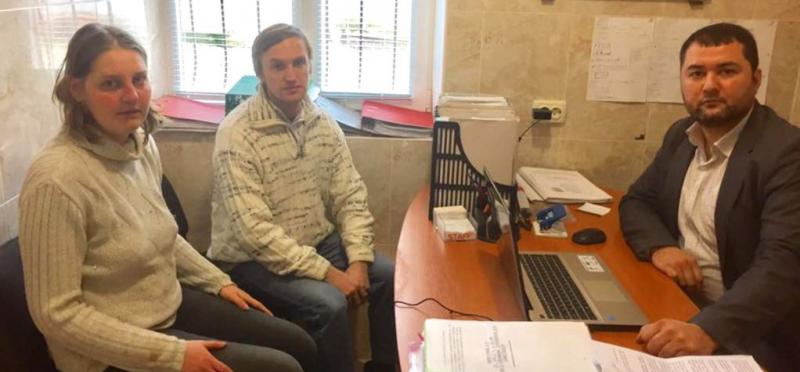Ukrainian activist forced to flee FSB persecution in Russian-occupied Crimea

The Crimean Human Rights Group reported on Wednesday that Kharchenko had safely arrived in Kyiv on June 20. Her husband, Ivan Vinohradov, has been in Kyiv for the last few weeks, and the couple are now desperately in need of accommodation and other assistance. For the moment, the couple’s two young daughters are remaining with their grandparents in Crimea.
Kharchenko was left with no choice as the FSB were planning to initiate criminal proceedings against her on Wednesday. There are conflicting reports as to the specific ‘extremism’ charge that she was facing, with the Crimean Human Rights Group mentioning Article 280.1 of the Russian criminal code. If that is the case, she would have joined Crimean Tatar leader Ilmi Umerov; Crimean journalist Mykola Semena and activist Suleiman Kadyrov in being charged with making ‘public calls to action aimed at violating Russia’s territorial integrity’. This article came into force a few months after Russia’s invasion and annexation of Crimea and has now become one of the weapons Russia is using against Ukrainians and Russians who rightly insist that Crimea is part of Ukraine.
Both Kharchenko and Vinohradov were members of the Ukrainian Cultural Centre in Simferopol and have never concealed their ‘pro-Ukrainian views’. The first sign of the trouble looming came with an illegal FSB search of their home on January 12 under the guise of an ‘inspection’. The couple’s children were understandably terrified by the visitation during which the FSB removed several computers and took both parents away for questioning.
Vinohradov was soon released, while Kharchenko was subjected to a four-hour interrogation with her lawyer, Edem Semedlyaev prevented from being present. After the questioning, and still without her lawyer, Kharchenko was forced to sign an undertaking not to divulge any information.
The ‘preliminary investigation’ without charges being formally laid was, typically, over a post, and specifically, a photo, on the social network VKontakte, with the initial article of the criminal code mentioned being 280 § 2 (‘public calls to carry out extremist activities carried out with the use of the media or Internet’). The photo showed Kharchenko in camouflage gear with a Ukrainian flag, against Crimean landscapes.
Vinohradov later reported that both he and his mother-in-law lost their jobs after the detention, and that he received an open hint that it would be better for them to leave Crimea.
The delay in formally laying charges was doubtless aimed at forcing the couple – and other like-minded Ukrainians – to leave. Over the following months Kharchenko was summoned for questioning four times, with Semedlyaev reporting that the FSB had come up with two ‘volumes’ of material.
According to her husband, Kharchenko suffers from a chronic illness of the nervous system which has, understandable, been sharply exacerbated by the pressure the couple have been placed under.
Russia is using a combination of criminal prosecutions, harassment, threats and armed searches to drive pro-Ukrainian activists out of Crimea. There are also increasing reports that it is populating the peninsula with Russians, a policy first applied during the Stalinist period, when Russians were brought to Crimea and often occupied the homes of Crimean Tatars and other groups forcibly deported in 1944. All of this is in grave violation of international law.





